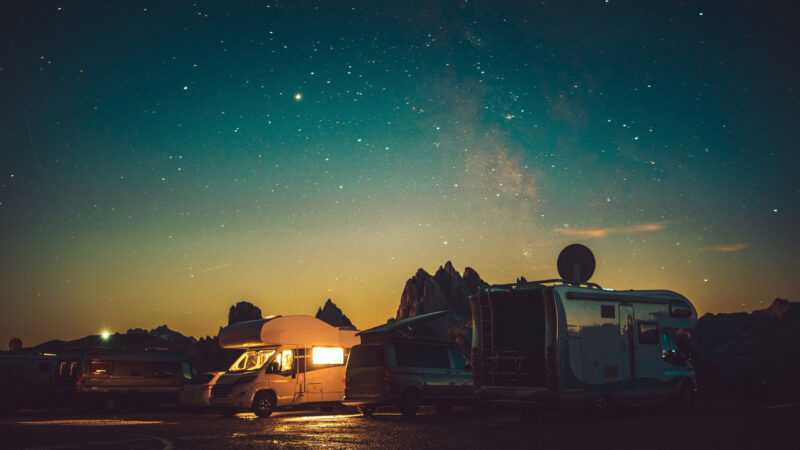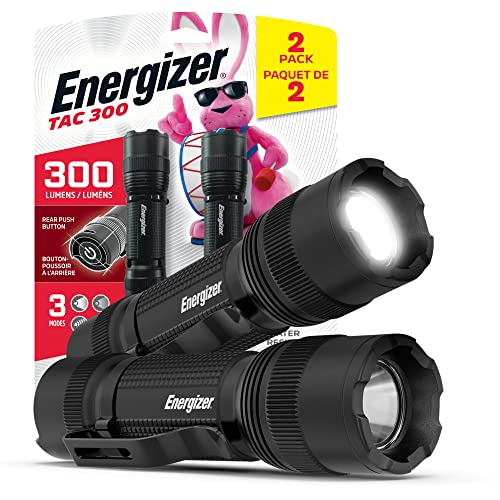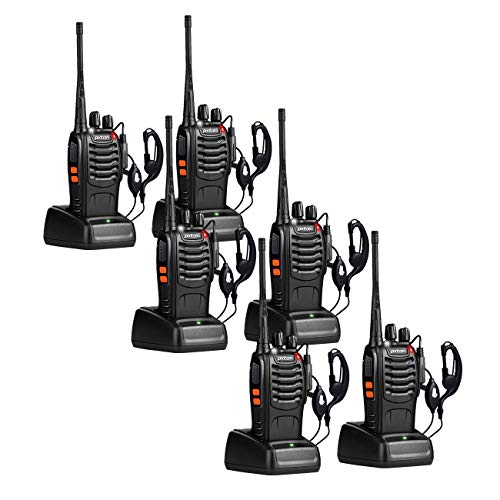Table of Contents Show
Under ideal circumstances, you arrive at a campground during daylight hours, and the weather is perfect. However, if RVing has taught us anything, life can be unpredictable. Many factors are beyond your control.
You could have to pull into a campground hours after the sun has set. Trust us, we’ve been there, and it wasn’t an enjoyable experience. We learned a thing or two and now know what we need to do the next time we find ourselves in a similar situation.
Today, we’re sharing a handful of tips you can use when you eventually arrive at your campsite in the dark. Let’s dive in!
You Might Not Want to Be Late, But It Happens
You may not plan to arrive late, but stuff happens. Bumper-to-bumper traffic, flat tires, and sketchy road conditions can all cause significant delays in your travel plans.
It’s vital that you keep your calm and remain as flexible as you possibly can. Stressing out and losing your temper will likely only cause intense emotions for you and your passengers.
How Late Can I Show Up to a Campsite?
Campgrounds typically have a specific way they handle late arrivals. Many campgrounds will allow you to arrive after hours and check yourself in.
They’ll often hang check-in materials on a bulletin board near the registration station. Very few set a specific time that’s too late for you to arrive at your campsite but may ask that you arrive before quiet times.

What Does Quiet Time Mean at a Campground?
Quiet time in a campground is typically from 10 p.m. to 6 a.m. During this time, campers should be mindful that other campers are likely trying to get some rest. Campers should keep noise to a minimum.
It might surprise you how far your voice and music will carry in a very quiet campground.
If you’re violating the quiet time rules, you’ll likely get a visit from an angry neighbor or the campground’s host reminding you of the rule. In some cases, they can ask you to pack your things and leave.
Tips for Arriving Late at a Campground
As we said earlier, you might not want to be late, but it happens. Here are a few tips for arriving late at a campground that can help make the experience as painless as possible.
Call the Office to Confirm Any Special Instructions
This is the key to a smooth late arrival. The office can provide you with any special instructions that could be helpful to know when you arrive.
This is essential if you’re staying in a new or unfamiliar campground. You want to ensure there aren’t any low clearance issues or tight corners that you may need to navigate in the dark.
The second you realize that you’re going to be late, give the office a call. You don’t want to wait until it’s too late and they’ve already closed up shop for the day.
It’s a good idea to download a copy of the park map to your phone and get a good idea of the layout so you can navigate the campground more easily.
Keep in Mind: Do campgrounds actually enforce the RV 10 Year Rule? Let’s dive in!
Have Flashlights Ready to Go
We strongly suggest always having a couple of flashlights stored in your glovebox or center console. These can help you avoid obstacles while navigating your rig through a dark campground.
It’s typically not the objects you can see that you have to worry about; the things you can’t see cause the biggest problems.
Don’t forget to check the batteries on these flashlights regularly. There’s not much worse than going to use a flashlight and discovering dead batteries.
A flashlight with dead batteries is about as useful as a paperweight. Carry a pack of spare batteries that you can quickly drop into the flashlight in these types of situations.
- Energizer TAC 300 LED Tactical Metal Flashlights (2 Count) include 2 Energizer CR123 batteries
- Compact and lightweight, these easy-to-carry flashlights help illuminate dark spaces with a beam up to 100 meters and...

Get Out and Walk the Site First
Not only will your flashlight be helpful when navigating through a dark campground, but also once you arrive at your campsite. We recommend taking a quick walk around your campsite when you arrive.
It doesn’t matter whether it’s dark or not; a short walk around can help you get a feel for the site and develop an immediate plan for where you need to park your rig.
If it’s dark, use your flashlight to quickly sweep the area for any items that might be in the way. Look for fire pits, electrical pedestals, picnic tables, or any large rocks or poles that might hinder you while parking.
While it’s obvious to look at the ground, don’t forget to look up too. Tree limbs can hide in the cover of darkness and do a number on your RV’s roof.
Use Walkie-Talkies or Cell Phones
Try to make as little noise as possible when navigating a campground and getting into your campsite late at night.
If the driver and spotter yell back and forth to each other, it will create a lot of noise for sleeping campers. We strongly recommend using walkie-talkies or cell phones to communicate with each other.
Remember that cell phone service can be spotty or non-existent in many campgrounds. For this reason, we prefer to use walkie-talkies to help the driver and spotter communicate.
Just make sure both parties are on the same page and use terms like “drive side” and “passenger side” instead of “left” and “right,” which can be very confusing.
- 【Diversified functions】FCC ID: 2AX68PX-888S, 16 preset channels can be selected by rotating the knob on the 2 Way...
- 【Long-Range communication】walkie talkies long range can reach 3 miles in open areas such as rural areas, suburbs or...
Turn Off Your Engine ASAP
No matter your vehicle, the engine will make noise as you maneuver your rig into your campsite. However, diesel engines and vehicles with modified exhausts will be the noisiest.
Depending on the time of night, there’s a chance it will wake people trying to get some sleep near you. Make sure you turn off your engine as soon as you possibly can. Avoid turning it on and off repeatedly. Do what you’ve got to do to get your RV in place and shut it off.
Do Non-Essential Setup the Next Day
If you’re arriving late, there’s no reason to start setting up your entire campsite. This can wait until the sun and those sleeping around you rise in the morning. Do the bare minimum when it comes to setting up your camp.
Level your RV, connect to power, water, and sewer (if necessary), and open your slides. There’s a good chance that everything else can wait until the morning.
Pro Tip: Set up your campsite like a pro and avoid making these 5 Common RV Setup Mistakes

If It’s Too Intimidating, You Can Always Lot Dock
There’s no shame in waiting if you’re uncomfortable with trying to navigate your rig through an unfamiliar campground in the dark. We tried to back our rig into a site in the dark after quiet hours once, and it turned out to be too tough.
We felt we were being too disruptive between our diesel truck, talking to each other, and flashing our lights around.
Instead of angering our soon-to-be camping neighbors, we returned to the main campground parking lot, and lot docked overnight.
Once the sun rose the following day, we went to our campsite and backed into the spot without any issues. It was a lot less stressful for us and a lot less annoying to those trying to get some sleep.
Be Prepared When Arriving Late
Now you know how to respond when arriving at a campsite late. It’s not the end of the world or something you should stress about.
However, you can make the situation substantially worse if you force yourself and your rig through an unfamiliar campground in the dark.
You could damage your rig or someone else’s property, likely resulting in an insurance claim. So please take a deep breath and follow our tips to help make the entire experience as smooth as possible.
Last update on 2025-01-13 / Affiliate links / Images from Amazon Product Advertising API








